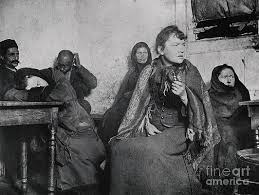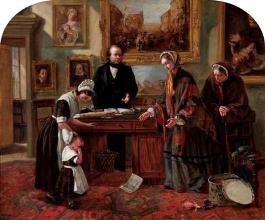Getting Down and Dirty in Historical Fiction
Chamber pots, head lice, the pox—and I don’t mean the kind prefaced by “chicken”—writing historical fiction, especially romantic historical fiction, calls for striking a balance between authenticity and contemporary sensibilities. I still recall, with lingering discomfort, watching Braveheart for the first time. Spending nearly three hours with Mel Gibson’s William Wallace and his men blanketed in sweat, blood, and woad was nearly as excruciating for me as the final execution scene.
In PBS’s Sanditon, adapted from Jane Austen’s unfinished novel set in an upstart coastal resort striving to be the next Brighton, Sidney Parker (Theo James) opts for a refreshing — and unencumbered — solo sea bath, emerging from the cleansing froth just as Charlotte Heywood (Rose Williams) trots up. The birthday suit booty comes early on in episode two, which surely would send Miss Austen clutching her pearls. Or, more properly, turning in her tomb.

Getting Wet
In Medieval times, providing a bath was part and parcel of the hospitality on offer to visiting knights and other honored male guests. The ritual was performed in private and hands-on by the chatelaine of the castle—talk about your potentially sexy novel scenario!
England’s Queen Elizabeth I couldn’t abide malodors from her courtiers or herself. Her commitment to cleanliness called for hauling her private bath on every stop of every Royal Progress.
But what about everyone else, those whose social station fell somewhere between lordly and lowly?
Making an indoor bath happen was a time-consuming labor. Water was brought in from an outside well, heated in the kitchen, and then carried in heavy, copper-lined buckets up flights of often steep, winding stairs. But there were alternatives. The remains of hot rocks baths, communal bathing pools lined with smooth stone and sometimes roofed against inclement weather, have been excavated throughout Scotland and parts of Ireland. Some sites were proximate to naturally occurring thermal springs, but others were not. In the latter case, buckets of heated stones or rocks were periodically added to the water, maintaining a semi-constant warmish temperature. Quelle steamy story setup for an historical romance writer!
Regency rake and original male fashionista, Beau Brummell is known as much for bringing fastidiousness into vogue as he is for his elaborate snowy waterfall neck cloth and champagne-based boot blacking. We have Brummell to thank for bringing regular bathing to the in crowd.
Toothsome Tales
Medieval people also took regular care of their teeth, and I don’t only mean visiting the blacksmith or other local tooth puller once things got… ugly. Tooth powders were the precursors to Crest and Colgate. Certain wood barks were ideal for cleaning between teeth. Chewing fennel and other breath-freshening seeds was a common practice between and after meals—early Altoids! Recipes for soaps and bath salts were passed down from mother to daughter.
Getting Physical
By the late 1990’s and early aughts, historical romances began embracing grittier, less airbrushed depictions of hygiene and intimacy. Take, for example, Outlander by Diana Gabaldon, the launch to her brilliant and beloved Scottish time travel series. During Jamie and Claire’s wedding night lovemaking, his curious kisses stray… south. The usually randy Claire halts him, protesting that he must be put off by her unwashed state. Smiling, Jamie likens the situation to a horse learning his mare’s scent. And proceeds to prove how very not put off he is.
We don’t call them “heroes” for nothing. 😉

By now most of us are familiar with the infamous tampon scene in Fifty Shades of Grey by E.L. James. In historical romances, our heroines rarely have their periods until they don’t and then only in the service of the story, notably advancing the tried-and-true “marriage of convenience” trope. Rarely do we see in fiction what dealing with menstruation must have meant for our foremothers. Plug-like devices for blocking flow are traceable to ancient Egypt (papyrus) and Rome (wool). The modern, mass-produced tampon wasn’t invented until 1929. Patented in 1931 by creator Dr. Earle Haas, this remarkably liberating new product was later trademarked “Tampax.”
Such advances are all well and good but what about having the personal space to put them into practice? Not even gentlewoman Jane Austen had a room of her own. In Irish Eyes, my women’s historical fiction debut (on submission), my Irish immigrant heroine shares a three-room Lower East Side, New York tenement flat with a family of seven. Finding the privacy to change clothes, bathe, relieve herself and manage menstruation as she must is a challenge few of us can imagine facing. Yet as documented by turn-of-the-century reformer, Jacob Riis in How The Other Half Lives, those were the very circumstances in which the vast majority of immigrant arrivals to New York found themselves.

Historical fiction fans are an exceptionally savvy lot. Anachronisms invariably jar us from the story; too many may well have us pulling the plug without reaching the end. And yet none of us truly knows what it was to live in a previous century or, for that matter, generation. We conduct our research in the service of the story. Fortunately, romantic historical fiction focuses not on the ordinary but on the extraordinary. Not on tepid tenderness but on grand passion and great stakes. Not on how dark, dreary and dirty life can be but on how amazing real love is and always will be.

An earlier version of this article appeared in Heroes & Heartbreakers.
Copyright Hope C. Tarr
Read the first chapter of Tempting, my award-winning Victorian-set historical here, then get the book on Amazon and elsewhere for #99cents.
Twitter @hopetarr Instagram @hopectarr

















